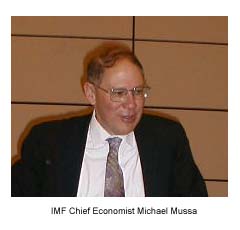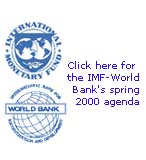|
Europe can pick up slack
|
 |
April 14, 2000: 12:56 p.m. ET
11-member euro zone in best position to offset a slowing U.S. economy
By Staff Writer M. Corey Goldman
|
WASHINGTON (CNNfn) - The euro region is the area of the world best able to pick up the slack in demand that a slowing U.S. economy would create, if the U.S. economy begins to respond to the effects of higher interest rates, International Monetary Fund Chief Economist Michael Mussa said Friday.
Speaking to reporters at an IMF news conference on world currency exchange regimes, Mussa said that the U.S. economy needs to slow down from its excessive and potentially inflationary pace of growth to a more sustained level - something that many analysts and economists expect will happen as the Federal Reserve's rate rises filter their way into the economy.
At the same time, Mussa said he thinks the euro region is in the best position to pick up the slack in demand that would be created by slowing U.S. growth - something that would help sustain world output in the long term and avoid other countries dependent on U.S. purchases of their goods and services to see slowing in their own economies.
"We need to get the U.S. economy to slow down and, in the meantime, we'll need someone to pick up the slack," Mussa told reporters at an IMF news conference on world currency exchange regimes. "That could be in the euro area. I think the (European Central Bank) needs to pay specific attention to what's happening both within and beyond their borders."
Avoiding currency crises
Mussa remarks came in a briefing following the release of an IMF study on different types of currency exchange regimes in the wake of the currency crises of the 1990s, including the "tequila crisis" in Mexico in 1995 and the Asian and Latin American currency crunch in late 1997.
 The panel also focused on the relationship between the euro, Europe's new central currency being incorporated by 11 different countries, and the U.S. dollar, noting that it saw continued volatility between the two currencies in the near term. At the same time, Mussa said the fund saw no reason for the ECB to raise interest rates further to correct that. The panel also focused on the relationship between the euro, Europe's new central currency being incorporated by 11 different countries, and the U.S. dollar, noting that it saw continued volatility between the two currencies in the near term. At the same time, Mussa said the fund saw no reason for the ECB to raise interest rates further to correct that.
"We do not see the Fed or the ECB forgoing regional concerns for the sake of an exchange rate," IMF Research Department's senior policy adviser Alexander Swoboda said. In other words, both the Fed and the ECB have their sights trained on the progress of their respective economies, not on the level of their currencies in relation to each other, he said.
The ECB earlier this week opted to leave its benchmark interest rate unchanged - a move widely expected by economists. The rate currently stands at 3.75 percent, compared to a rate of 6 percent in the U.S.
Keep rates steady, Japan
Like most senior officials at this week's meetings, Mussa took the opportunity to voice concern over Japan's consideration of raising its own lending rates - a move that Japan is weighing to avoid deflation.
"There has to be an understanding that further strengthening of the yen at this stage could be damaging to Japan's economy," Mussa said. If the Bank of Japan raises rates from their current level of nil, the result will be more international money being converted into yen, driving up its value, he said.
 Officials also emphasized the need for emerging market economies to focus on what they believe is a more preferable system of currency exchange - the floating exchange rate. A floating exchange rate means a country allows market forces to determine what the value of its dollar is worth, and does not try to peg it to a certain level to make its economy more attractive. Officials also emphasized the need for emerging market economies to focus on what they believe is a more preferable system of currency exchange - the floating exchange rate. A floating exchange rate means a country allows market forces to determine what the value of its dollar is worth, and does not try to peg it to a certain level to make its economy more attractive.
While that can be more demanding in terms of internal fiscal requirements - keeping inflation to a minimum and ensuring the country's balance sheet remains strong, for example - the end result is an exchange rate that entices investment into the country, helping foster economic growth, the panel said.
"You have a peg or dollarization on one extreme and a free float on the other extreme," Mussa said. "An exchange rate that goes up and down with market forces can be beneficial, but they have to be careful about managing their businesses and their balance sheets." 
|
|
|
|
|
 |

|

